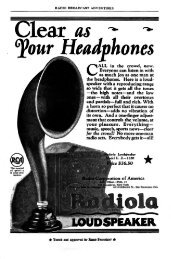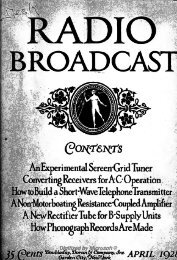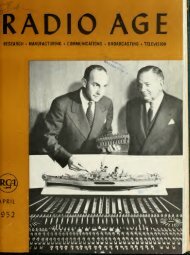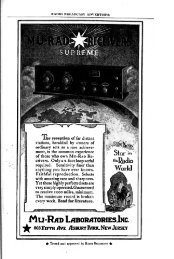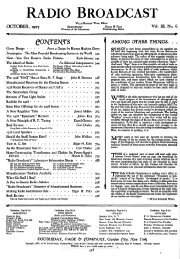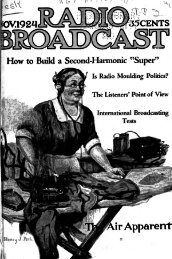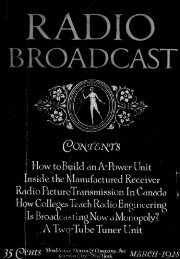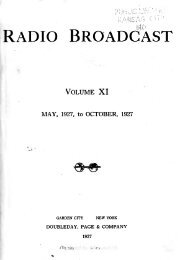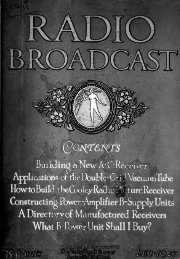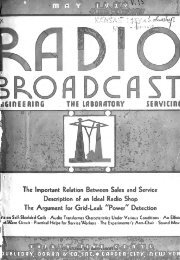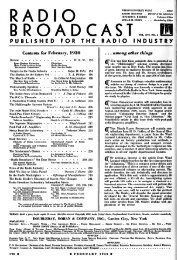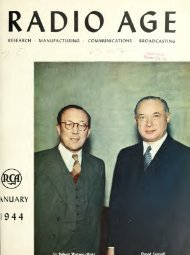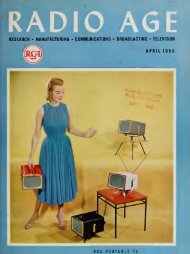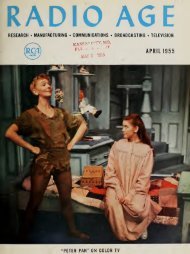Radio Broadcast - 1925, February - 113 Pages ... - VacuumTubeEra
Radio Broadcast - 1925, February - 113 Pages ... - VacuumTubeEra
Radio Broadcast - 1925, February - 113 Pages ... - VacuumTubeEra
Create successful ePaper yourself
Turn your PDF publications into a flip-book with our unique Google optimized e-Paper software.
!<br />
of<br />
;<br />
an<br />
Some Experiences With the Blind and <strong>Radio</strong> 693<br />
Some of my visits were quite inspiring.<br />
For instance, one man who had been blind<br />
,for about seven years was extraordinarily<br />
cheerful, and he told me that until he adjusted<br />
himself to his new life he was very, very unhappy.<br />
Finally he convinced himself that a<br />
man could live and take an active part in life<br />
though blind; and when he had done this he<br />
became happy, and has been happy ever since.<br />
He had accomplished the<br />
extraordinary feat<br />
building himself a house, mostly with his<br />
own hands and the help of his wife. He was<br />
enthusiastic radio fan, but had to go a mile<br />
and a quarter to the house of a friend when<br />
he wanted to listen in, and this was difficult<br />
because he had to have some one take him.<br />
Naturally, the idea of having a machine for<br />
himself was a source of great joy to him.<br />
Three or four blind 1<br />
people found had a<br />
radio, and all of them were receiving the<br />
greatest benefit and enjoying it hugely.<br />
HOW THE SETS WERE INSTALLED<br />
rounding up all<br />
AFTER the people whom<br />
I could find, I enlisted the help of the<br />
Boy Scouts to put up the machines and take<br />
care of them. We selected a very simple type<br />
of machine, some with a pair of head phones,<br />
and some with loud speakers. The cost of<br />
the machine, batteries, and tubes was about<br />
.forty dollars apiece. The Boy Scouts put<br />
.them up, of course without charge, and are<br />
expected to make a monthly inspection of each<br />
blind person's radio and report the conditions.<br />
Although there were some blind people who<br />
were unwilling to have anything to do with<br />
this new-fangled machine, in almost every case<br />
persuaded them that they would get pleasure.<br />
I<br />
The humorous side has been their<br />
fear<br />
that it would cost them money. Without exception,<br />
they showed the greatest apprehension<br />
lest they would be led into- something<br />
which would bring them financial responsibility.<br />
When I told them that I was doing this<br />
for pleasure, they did not accept it with any<br />
degree of cordiality, feeling that there was<br />
something behind which they did not understand;<br />
in fact, that something was being put<br />
over on them.<br />
The experience of visiting these people,<br />
which I<br />
apprehended would be an unpleasant<br />
job, was quite the reverse. Enough people<br />
were very grateful to make the whole enterprise<br />
worth while, and I feel sure that the<br />
success of the thing is beyond peradventure.<br />
the readers of RADIO BROADCAST<br />
Among<br />
there must be thousands who could do this in<br />
their local town or county. My own experience<br />
has proved that it has to be done personally<br />
and cannot well be done by somebody<br />
hired for the job.<br />
I<br />
cordially recommend the<br />
idea to anybody who wants to add comforts<br />
and pleasure to the lives of blind people. If a<br />
sufficient number of people could be got together<br />
to cover the country, the load of pain<br />
and suffering would be tremendously decreased.<br />
For the practical reader I<br />
may say that the<br />
machine we have found best adapted to the<br />
purpose is of the reflex type.<br />
THE title<br />
"AS THE BROADCASTER SEES IT"<br />
of an interesting series of articles by Carl Dreher, the<br />
ISfirst of which will be a feature of this magazine for March.<br />
What the broadcaster is<br />
doing, how he does it, and what he is<br />
thinking of while he is<br />
doing it, will form the subject matter of this<br />
series which should interest those both active and passive in radio.<br />
"As the <strong>Broadcast</strong>er Sees It," will give the broadcasters engineers<br />
and program directors a place where they may exchange ideas.<br />
Listeners will be able to "look at" broadcasting from the inside.<br />
Mr.<br />
Dreher is chief engineer of one of the best known American broadcasting<br />
stations. These articles will not supplant but complement<br />
"The Listeners' Point of View."



